Hundreds of migrants trapped by clashes in Libya capital evacuated

Hundreds of migrants in Libya's capital Tripoli have been relocated from government-run detention centres after getting trapped by clashes between rival groups, United Nations and aid sources told Reuters news agency on Thursday.
The migrants had been abandoned after their guards fled fighting that erupted in the city between rival militias, in clashes that are undermining the status of the UN-backed Government of National Accord (GNA).
Aid workers told Reuters that hundreds of migrants - who had reportedly been trapped without food or water - were brought to a "safer place" from two GNA-run centres in the the Ain Zara area in southeastern Tripoli.
The UN refugee agency UNHCR "in coordination with other agencies and the Department for Combatting Illegal Migration (DCIM) facilitated the transport of all persons in Ain Zara," it said in a statement.
Not all of the migrants have been evacuated. An official at an international organisation told Reuters that a few people were still waiting to leave Ain Zara.
However the majority for the migrants - who mostly originate from Eritrea, Ethiopia and Somalia - have been transported to a different detention centre.
According to one aid source as many as 1,500 migrants were originally caught up in the fighting. Many escaped or were transferred to other centres before the clashes closed in, leaving around 400 people abandoned in Ain Zara.
Libya is a major departure point in North Africa for migrants crossing the Mediterranean Sea to Europe, mainly from other parts of Africa.
The number of crossings has sharply fallen off since Italy provided the Libyan coastguard with more boats and brokered deals with local groups in a smuggler hub last year.
New MEE newsletter: Jerusalem Dispatch
Sign up to get the latest insights and analysis on Israel-Palestine, alongside Turkey Unpacked and other MEE newsletters
Middle East Eye delivers independent and unrivalled coverage and analysis of the Middle East, North Africa and beyond. To learn more about republishing this content and the associated fees, please fill out this form. More about MEE can be found here.




